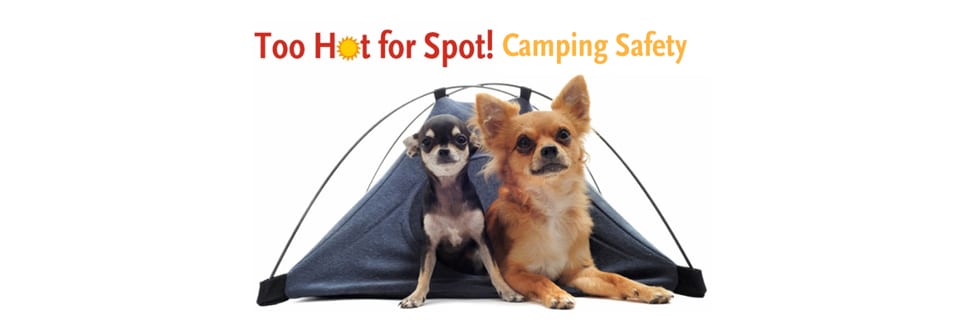Dog Camping Safety
5 tips to protect your pup during your next outdoor adventure
Although back-to-school season is just around the corner, the beautiful summer weather in New England extends throughout most of September! With at least a month of more warm days ahead of us, the Animal Rescue League of Boston (ARL) continues to share important pet safety advice during our TOO HOT FOR SPOT® campaign.

Follow ARL’s 5 tips for dog camping safety to ensure a fun outdoor experience for everyone. Photo source: 50campfires.com
Planning an upcoming wilderness adventure? Call the campground in advance to confirm pet requirements; some may mandate such regulations as dogs must remain on 6-foot leash at all times and need to sleep inside your tent.
If you and your pup take the proper precautions and follow the campsite rules you’ll be both guaranteed to have fun in the great outdoors.
The ARL shares 5 tips for dog camping safety:
- First aid’s first. Pack a pet first aid kit to cover all types of scenarios. In preparation for more a serious situation, be sure to research emergency animal clinics in close proximity to your campsite. While park rangers are there to help, they may not have all of the medical equipment that your dog needs.
- Pet-proof your campsite. Before pitching that tent, thoroughly inspect the immediate area for any potentially harmful items, such as broken glass bottles or spoiled food, that previous campers left behind.
- Avoid roaming. Supervise your pooch at all times, even if it means keeping them on a leash or having them wear a reflective collar at night. Since your pet is not familiar with the area, they could become lost, walk too close to a campfire, ingest poisonous plants, or encounter potentially dangerous wildlife.
- Keep contact info current. Make sure your dog’s microchip and ID tag information is current and keep your canine companion’s collar on at all times to ensure an easy reunion should they be separated from you.
- Prevent parasites and illnesses. Keep your pup up-to-date on all parasite preventatives and vaccinations, such as flea and tick repellants. If you’re not certain if your pet’s vaccinations are current, contact your veterinarian. Be vigilant about checking your pet for ticks during and after your trip.
If you plan to bring Fido with you, remember that man’s-best-friend should remain by your side at all times. Never leave your pet alone in a parked car—even with the air conditioner on or the windows cracked. On an 85 degree day, the temperature inside a car can rise above 100 degrees in less than 10 minutes, which is why it is the most common cause of deadly heat stroke. And that’s just way too hot for Spot!
ACHOO! Pets get allergies too. If your pooch can’t stop sneezing during your fresh air activities, learn how to help keep those airborne allergens at bay.
For more summer safety tips visit: arlboston.org/summer-safety

